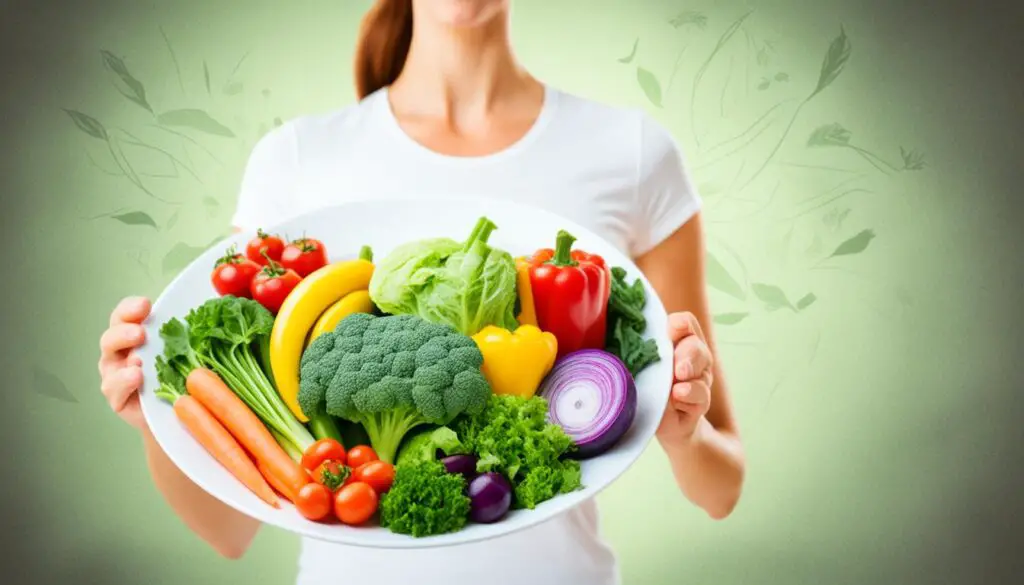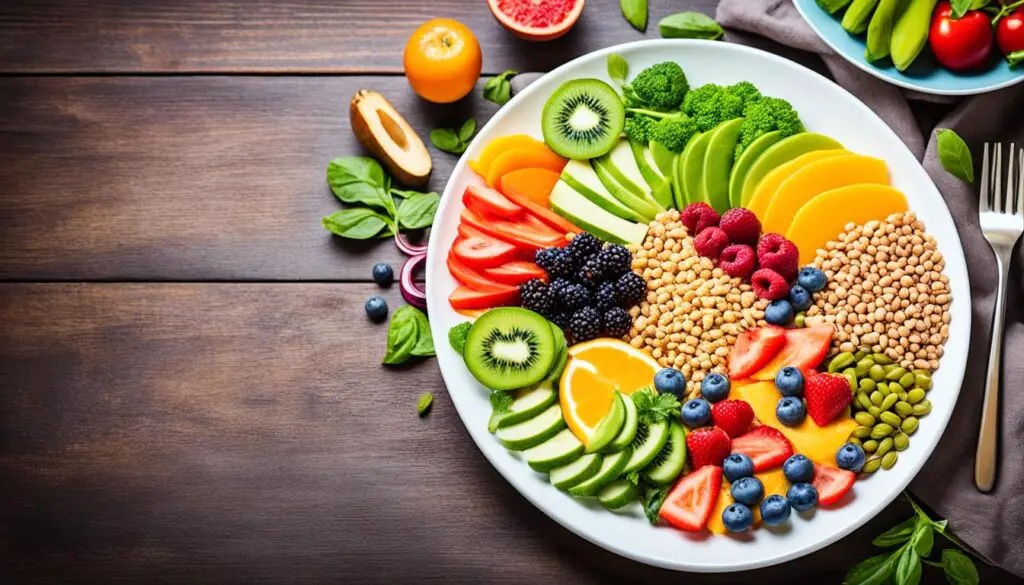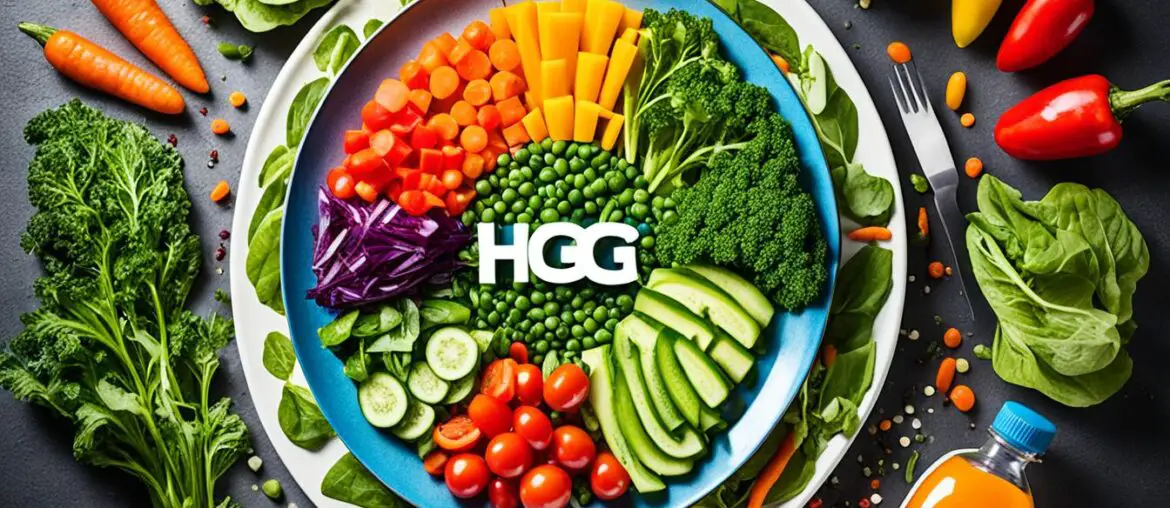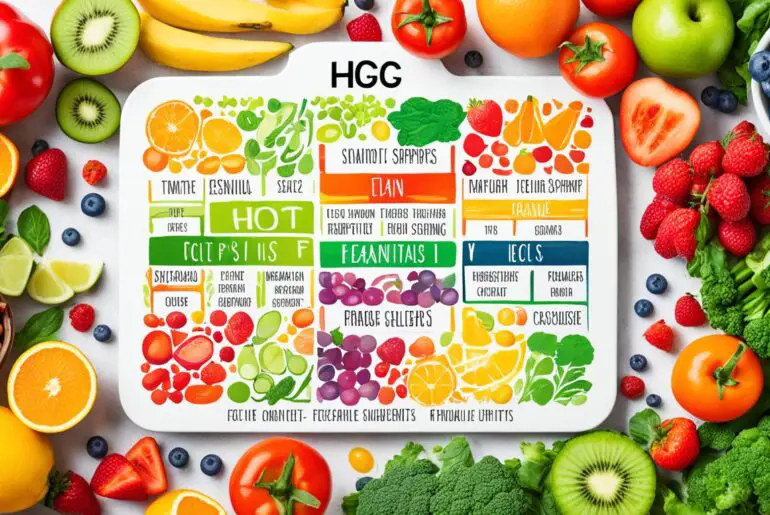The HCG diet is a popular weight loss program that typically involves animal protein. However, did you know that it is also possible for vegans to follow a modified version of the HCG diet? With simple substitutions and a focus on vegan protein sources, vegans can achieve weight loss and experience the benefits of the HCG diet. Adequate protein intake is crucial for successful weight loss on the HCG diet, and vegans can replace meat-based protein with vegetarian or vegan alternatives. By following a vegan HCG diet, rapid weight loss and increased energy levels can be achieved.
Key Takeaways:
- Vegans can follow a modified version of the HCG diet by making simple substitutions and focusing on vegan sources of protein.
- Protein is essential for successful weight loss on the HCG diet, and vegans can replace meat-based protein with options like tofu, tempeh, and protein powder.
- Vegan HCG diet can lead to rapid weight loss and increased energy levels.
- It is important for vegans to ensure they reach their recommended daily protein intake while staying within the calorie restrictions of the HCG diet.
- By following the HCG diet guidelines and choosing high-protein vegan alternatives, vegans can successfully reach their weight loss goals.
Vegetarian and Vegan Options for the HCG Diet
The HCG diet program can be tailored to accommodate vegetarian and vegan lifestyles. For vegetarians who include fish in their diet, it is easy to swap out meat options for fish. However, for vegans who avoid all animal products, finding high-protein alternatives can be challenging. Fortunately, there are several options available that provide sufficient protein while adhering to a vegan diet.
- Cottage cheese: A versatile and protein-rich option for vegans on the HCG diet.
- Protein powder: A convenient and easy way to supplement protein intake and support muscle recovery.
- Tofu: A popular plant-based protein source that can be used in various dishes, including stir-fries and salads.
- Tempeh: Made from fermented soybeans, tempeh is packed with protein and adds a hearty texture to meals.
- Miso soup: This traditional Japanese soup is made from fermented soybeans and provides a good source of protein.
- Eggs: For vegetarians who include eggs in their diet, they can be a valuable source of protein on the HCG diet.
By incorporating these options into a vegan HCG meal plan, individuals can successfully follow the HCG diet while adhering to their plant-based lifestyle. It is also crucial for vegans to consider including probiotics in their diet to support gut health and control food cravings. A vegan-friendly weight loss program like the HCG diet offers a viable solution for those seeking to lose weight while following a vegan or vegetarian diet.
“The vegan HCG diet offers a variety of protein-rich options for individuals seeking plant-based alternatives while following the HCG diet.”
| Protein Source | Protein Content (per serving) |
|---|---|
| Cottage cheese | 15g |
| Protein powder | 20g |
| Tofu | 10g |
| Tempeh | 12g |
| Miso soup | 8g |
| Eggs | 6g |
Table: Protein Sources for Vegan HCG Diet
Vegetarian HCG Diet: Types of Vegetarian Diets

When considering a vegetarian HCG diet, it is essential to understand the different types of vegetarian diets. There are three main categories:
- Vegan Diet: Vegans exclude all animal products from their diet, including dairy and eggs. They solely rely on plant-based foods for nutrition.
- Lacto-Vegetarian Diet: Lacto-vegetarians consume dairy products but avoid meat and fish. They include milk, cheese, yogurt, and other dairy-based products in their diet.
- Lacto-Ovo Vegetarian Diet: Lacto-ovo vegetarians include both dairy products and eggs in their diet. They consume milk, cheese, yogurt, eggs, and other dairy-based products.
These distinctions are crucial when it comes to protein replacements on the HCG diet. While vegans need to find plant-based sources of protein, such as tofu, tempeh, legumes, and seeds, lacto-vegetarians and lacto-ovo vegetarians have more flexibility in their options.
The Importance of Protein in the Vegetarian HCG Diet
Protein is essential for successful weight loss on the vegetarian HCG diet. It helps to reduce appetite, support muscle growth, and maintain energy levels. For vegans, finding plant-based sources of protein becomes imperative. Options like tofu, tempeh, legumes, and seeds can provide the necessary protein intake while adhering to the vegetarian diet.
“The vegetarian HCG diet allows for flexibility in protein choices, making it accessible for vegans and vegetarians alike.” – Dr. Jane Thompson, Nutritionist
Meeting Protein Needs on the Vegetarian HCG Diet
Meeting the recommended daily protein intake while following the vegetarian HCG diet is crucial for weight loss success. Here’s a table showcasing protein-rich plant-based alternatives for vegans:
| Protein Source | Protein Content (g) |
|---|---|
| Tofu (100g) | 8g |
| Tempeh (100g) | 19g |
| Legumes (1 cup) | 15-20g |
| Seeds (2 tbsp) | 4-8g |
These protein substitutes can be incorporated into a well-balanced vegetarian HCG meal plan to ensure adequate protein intake without compromising the effectiveness of the diet.
Protein Substitutes for Vegans on the HCG Diet
Protein is an essential component of the vegan HCG diet, but finding suitable substitutes for animal protein can be a challenge. Luckily, there are plenty of plant-based options that can provide the necessary protein while adhering to the vegan diet. Here are some protein substitutes for vegans on the HCG diet:
- Tofu: This versatile soy-based product is a great source of protein. It can be used in a variety of dishes, from stir-fries to smoothies.
- Tempeh: Made from fermented soybeans, tempeh is packed with protein and has a nutty flavor. It can be grilled, fried, or crumbled and added to salads.
- Legumes: Beans, lentils, and chickpeas are excellent sources of protein. They can be included in soups, stews, and salads.
- Seeds: Flax seeds and pumpkin seeds are rich in protein and can be sprinkled on top of salads or added to smoothies.
- Superfoods: Hemp hearts and chia seeds are considered superfoods and are loaded with protein. They can be incorporated into your HCG meals through smoothies, oatmeal, or as a topping for yogurt.
These protein substitutes will not only help you meet your daily protein requirements but also provide you with the necessary nutrients for a balanced vegan HCG diet. Remember to monitor your calorie intake and choose options that fit within the calorie restrictions of the HCG diet.
Vegan HCG Diet Protein Substitutes:
| Protein Substitute | Protein Content per serving (g) | Calories per serving |
|---|---|---|
| Tofu | 10 | 70 |
| Tempeh | 15 | 90 |
| Legumes (beans, lentils, chickpeas) | 8-10 | 80-120 |
| Seeds (flax seeds, pumpkin seeds) | 4-8 | 50-80 |
| Superfoods (hemp hearts, chia seeds) | 10-15 | 90-120 |
These protein substitutes can be incorporated into your vegan HCG meal plan and recipes to ensure you stay on track with your weight loss goals while following a vegan-friendly HCG diet.
Phases of the Vegetarian HCG Diet

The vegetarian HCG diet follows the same phases as the traditional HCG diet. These phases are essential for achieving successful weight loss and maintaining results over time.
1. Loading Phase
The first phase of the vegetarian HCG diet is the loading phase. During this phase, individuals consume high-calorie foods to build up fat stores in their body. This provides the necessary energy reserves for the subsequent phases of the diet.
2. Weight Loss Phase
The second phase of the vegetarian HCG diet is the weight loss phase. In this phase, individuals limit their daily caloric intake to a range of 500-1200 calories, depending on their specific needs and goals. Additionally, the HCG hormone is administered to aid in weight loss and fat burning.
During this phase, vegetarians on the HCG diet can enjoy a variety of foods. A typical meal may include:
| Meal Component | Example |
|---|---|
| Protein Substitute | Tofu stir-fry |
| Fruits | Apple and berries |
| Vegetables | Spinach and cucumber |
| Carbohydrates | Quinoa |
3. Maintenance Phase
The third phase of the vegetarian HCG diet is the maintenance phase. After achieving their weight loss goals, individuals transition to a higher calorie diet while closely monitoring their weight. This phase is crucial for stabilizing the weight loss and establishing healthy eating habits.
During the maintenance phase, vegetarians continue to incorporate the principles of the HCG diet into their meals. This includes consuming protein substitutes, fruits, vegetables, and carbohydrates with each meal. Following a balanced and sustainable approach to nutrition is key to maintaining the results achieved during the weight loss phase.
By following the phases of the vegetarian HCG diet, individuals can achieve their weight loss goals while enjoying a plant-based approach to nutrition.
Conclusion
The vegan and vegetarian HCG diet plan can be a highly effective and sustainable weight loss solution for individuals who follow a plant-based lifestyle. By making appropriate protein substitutions and adhering to the HCG protocol, vegans can successfully achieve rapid weight loss and experience increased energy levels.
It is crucial for vegans to carefully choose high-protein vegan alternatives and closely monitor their calorie intake while on the diet. This ensures that they meet their nutritional needs while staying within the recommended HCG diet guidelines.
With careful planning and commitment to the HCG diet, vegans can successfully reach their weight loss goals and enjoy the numerous benefits associated with the HCG diet. Whether following a vegan HCG diet plan, a vegetarian HCG diet, or a plant-based HCG diet, individuals can achieve their desired weight loss results while maintaining a sustainable and healthy lifestyle.
FAQ
Can vegans follow the HCG diet?
Yes, vegans can follow a modified version of the HCG diet by making simple substitutions and focusing on vegan sources of protein.
What are some options for vegan protein on the HCG diet?
Some options for vegan protein on the HCG diet include tofu, tempeh, legumes, seeds, and superfoods like hemp hearts and chia seeds.
What are the phases of the vegetarian HCG diet?
The phases of the vegetarian HCG diet are the loading phase, weight loss phase, and maintenance phase. During these phases, individuals follow specific dietary guidelines and monitor their weight.
What are the different types of vegetarian diets?
The different types of vegetarian diets include vegans (exclude all animal products), lacto-vegetarians (consume dairy but avoid meat and fish), and lacto-ovo vegetarians (include both dairy and eggs in their diet).
How can vegans replace animal protein on the HCG diet?
Vegans can replace animal protein on the HCG diet with plant-based alternatives such as tofu, tempeh, and legumes.
Is the vegetarian HCG diet an effective weight loss plan?
Yes, the vegetarian HCG diet can be an effective and sustainable weight loss plan for those following a plant-based lifestyle.





